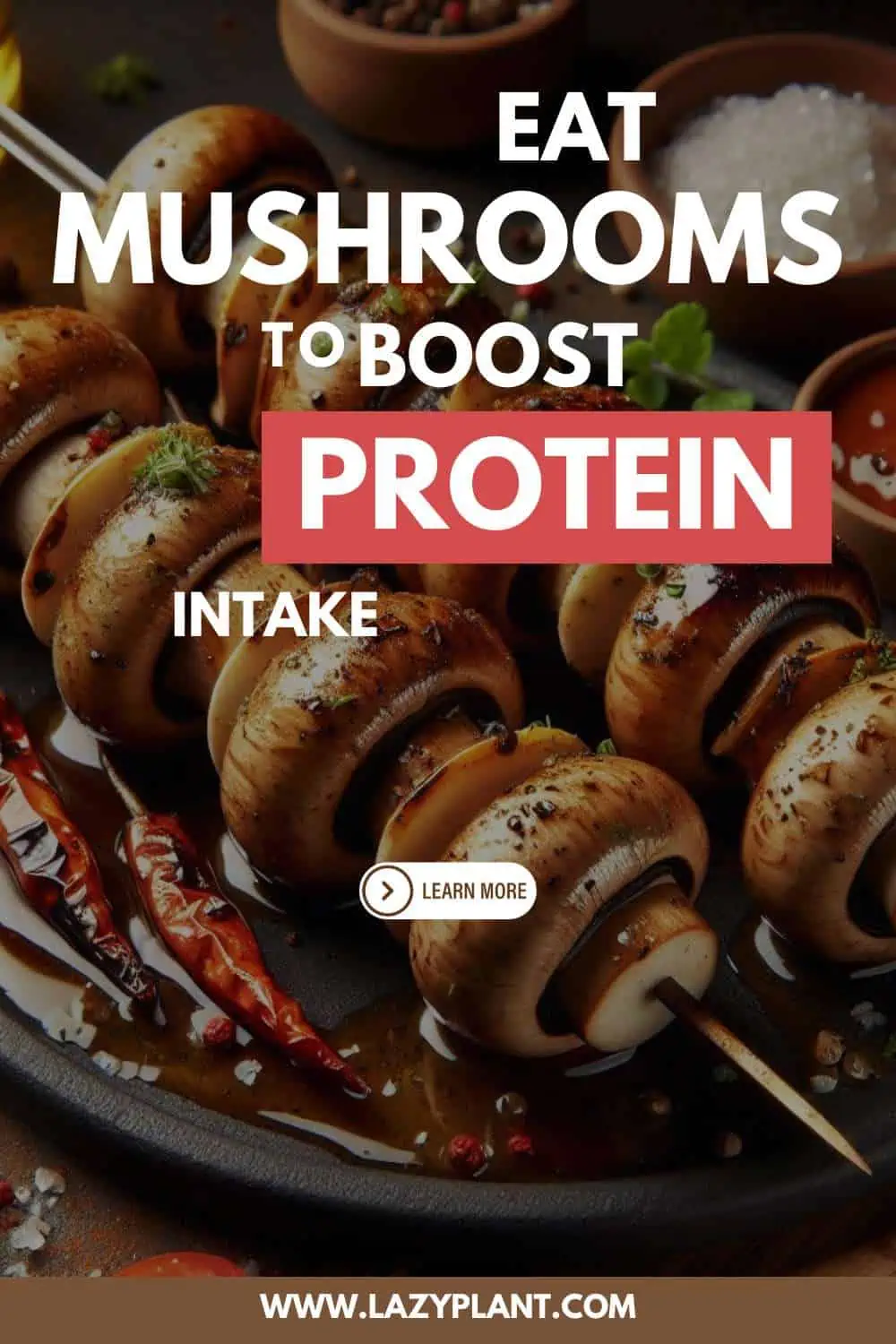Mushrooms support weight loss because they’re low in calories and very filling.
Can I eat Mushrooms on the Mediterranean Diet?
Yes, mushrooms are a great addition to the Mediterranean diet. They are rich in nutrients like B vitamins, selenium, and antioxidants, while being low in calories and fat.
Mushrooms are often included in Mediterranean dishes like salads, stews, or as a meat substitute in vegetarian meals. Their earthy flavor and versatility make them a perfect fit for the plant-focused, whole-food approach of the Mediterranean diet.
Low in Calories
Above all, mushrooms are good for weight loss because they’re low in calories. A serving has less than 35 calories!
You don’t have to worry about the calorie content of different varieties of mushrooms. All varieties are low in calories. They only contain between 19 and 34 calories per serving.
The cooking method plays a key role in the final calorie content of a mushroom recipe.
| calories per 100g | calories per serving | |
| beech | 40 | 34 |
| pioppini | 39 | 33 |
| enoki | 37 | 31 |
| shiitake | 34 | 29 |
| oyster | 33 | 28 |
| chanterelle | 32 | 27 |
| maitake | 31 | 26 |
| morel | 31 | 26 |
| portabella | 22 | 19 |
| white | 22 | 19 |
| crimini | 22 | 19 |
Dried mushrooms have a high calorie content though. They contain around 300 calories per 100g. You could eat them in moderation, as they’re nutrient-dense foods, though.
They’re a filling food
Foods high in water, protein, and fiber tend to be the most filling.[1]
Fiber Content
Most mushrooms are good dietary sources of fiber. A serving provides about 8% of the recommended daily intake. Chanterelle variety has the highest fiber content. Morel, maitake, enoki, shiitake, and oyster are pretty rich in fiber as well.
| fiber (g) per 100g | fiber (g) per serving | % RDI | |
| chanterelle | 3.8 | 3.2 | 12% |
| morel | 2.8 | 2.4 | 9% |
| maitake | 2.7 | 2.3 | 8% |
| enoki | 2.7 | 2.3 | 8% |
| shiitake | 2.5 | 2.1 | 8% |
| oyster | 2.3 | 2 | 7% |
| portabella | 1.3 | 1.1 | 4% |
| white | 1 | 0.9 | 3% |
| crimini | 0.6 | 0.5 | 2% |
They can help us meet our daily needs. Even a small 3-oz serving (85 g) of mushrooms can significantly increase our daily fiber intake.[2]
Mushrooms contain both soluble and insoluble fiber. But, they consist mostly of insoluble fiber. Actually, they’re about 90% insoluble and only 10% soluble fiber.[3]
Insoluble fiber doesn’t dissolve in water. It absorbs water, making the stool softer, helping defecation. On the other hand, soluble fiber dissolves in water, turning into a gel. It slows down digestion and has satiating effects. Hence, it supports weight loss.
To preserve more fiber while cooking mushrooms, include mushroom stems. They contain a good amount of fiber. To prevent nutrient loss, lightly sauté or cook them. Quick cooking methods, such as stir-frying, help preserve their fiber content.

Protein Content
Mushrooms have a high protein content. Actually, they’re 20-45% protein, depending on the variety. A serving of most popular mushrooms provides 2–3 grams of protein.
| protein (grams per 100g) | protein (grams per serving) | |
| pioppini | 3.5 | 3 |
| oyster | 3.3 | 2.8 |
| morel | 3.1 | 2.6 |
| white | 3.1 | 2.6 |
| enoki | 2.7 | 2.3 |
| crimini | 2.5 | 2.1 |
| shiitake | 2.2 | 1.9 |
| beech | 2.2 | 1.9 |
| portabella | 2.1 | 1.8 |
| maitake | 1.9 | 1.6 |
| chanterelle | 1.5 | 1.3 |
Mushrooms are considered a high-quality vegan protein source. They have a total of 17 amino acids, containing all essential amino acids.
However, mushrooms aren’t a complete protein. They contain low amounts of certain amino acids. Most mushrooms contain low amounts of the essential amino acids: methionine, phenylalanine, cysteine, or lysine.[3,4]
In contrast, mushrooms are high in all branched-chain amino acids (BCAAs) and especially leucine. These amino acids are usually found only in animal-derived foods. They’re essential for athletes. They stimulate muscle hypertrophy.

Is protein in mushrooms easily absorbed?
Mushroom protein isn’t easily digestible. It’s less bioavailable than other high-quality proteins, like milk, chicken, or soy.
Scientists measure the digestibility and the overall quality of protein with the Protein Digestibility Corrected Amino Acid Score (PDCAAS) index. High-quality proteins, like milk, eggs, and soy protein, have PDCAAS values of 1.
Beans, vegetables, fruits, and cereal have PDCAAS values of about 0.75, 0.73, 0.64, and 0.58, respectively.[5,6]
The PDCAAS values of common mushrooms are between 0.35 and 0.70.
Therefore, we should consume mushrooms with a wide variety of other foods in order to get a high-quality protein!
Mushrooms are more filling even than meat, having much fewer calories. Moreover, mushroom consumption can control appetite and decrease cravings for fattening foods. They can keep us full for a long time.[7]
Eating many foods low in calories but with great satiating effects, such as mushrooms, beans, vegetables, and fruits, is crucial for following a long-term diet for weight loss. Losing weight doesn’t necessarily mean you have to feel hungry all the time.
May Help you Build a Lean Body
Athletes who should maintain a lean body year-round should regularly consume mushrooms, as they appear to delay fatigue and reduce recovery time after a workout.
Polysaccharides, peptides, nucleosides, phenolic compounds, and triterpenoids are the main compounds in mushrooms that have potent antifatigue effects.[8]
Mushrooms inhibit blood lactic acid generation and accumulation and accelerate its clearance!
Furthermore, they increase glycogen storage in the liver and muscle. Also, they reduce glycogen consumption during exercise, resulting in less fatigue and best performance during a workout or a race!
In addition, mushrooms can enhance energy metabolism from carbs and fat to supply enough energy. Thus, mushroom consumption may limit protein breakdown!
Certain mushrooms. like “cordyceps sinensis” has a vasodilation effect on blood vessels. It helps to avoid fatigue by increasing blood flow to supply enough oxygen and nutrients to essential organs and muscles.
Enhanced oxygen delivery may increase exercise tolerance, raising the anaerobic threshold and delaying the onset of fatigue.
Also, certain compounds in mushrooms, like polysaccharides, affect the activities of certain enzymes, which are important for many functions of the body. They improve muscular function and control the synthesis of many hormones.
May stimulate testosterone synthesis
Moreover, mushrooms may help balance testosterone levels. High testosterone levels lead to muscle growth and high energy levels. According to a study, mushroom supplementation for 3 months increased the testosterone levels of athletes.[9]
Moreover, mushrooms are packed with antioxidant compounds. In fact, mushrooms have many health benefits. They have antiallergic, antibacterial, antifungal, anti-inflammatory, antioxidative, antiviral, anti-depressive, antihyperlipidemic, antidiabetic, digestive, hepatoprotective, neuroprotective, osteoprotective, and hypotensive activities.[10]
They may relieve athletes from muscle or joint pains, and also, reduce inflammations!
Portion Size for Athletes
Most studies used between 1 gram and 4 grams of mushroom supplements a day. Athletes improved VO2max, anaerobic threshold, muscle endurance, and testosterone levels after mushroom supplementation for at least 3 weeks. The greatest benefits were observed after 3 months of supplementation, though.[11,12]
Only after 3 months of mushroom supplementation, the athletes were protected against oxidative stress.[13]
Nutrients in Mushrooms support Weight Loss
Mushrooms are nutrient-dense foods. They’re packed with vitamins, minerals, and antioxidant compounds that help the body burn more fat and increase metabolism.
Mushrooms are excellent dietary sources of copper, potassium, selenium, riboflavin, niacin, melatonin, beta-glucan, and GABA.[14]
For instance, copper and niacin play a key role in the metabolism of carbs, protein, and fats.
Melatonin and beta-glucan regulate blood glucose.
Beta-glucan is a type of soluble fiber with many health benefits. Other common foods rich in beta-glucan are oats, barley, and seaweed. Beta-glucan seems to improve mineral absorption, like calcium and magnesium. Also, it’s an important prebiotic, as it improves gut health. It modulates the growth of beneficial probiotic bacteria in the colon.[15]
Selenium may improve insulin sensitivity, increase energy levels, and improve your mood, helping you follow a long-term diet.
GABA is a chemical that may naturally increase the Human Growth Hormone levels, and metabolism. It may promote muscle growth and help the body burn more belly fat.
In addition, mushrooms have decent amounts of zinc, iron, phosphorus, thiamine, biotin, folate, choline, and vitamin B6.
Also, they’re the only plant-based foods containing some vitamin B12 and vitamin D. People have a high risk of being deficient in these vitamins.
Vitamin B12 may help prevent muscle loss during weight loss. Preserving muscle mass is vital. Muscle mass burns many calories. More muscle mass means higher metabolism!
Mushrooms contain many compounds that support muscle growth.
Last, but not least, obese people are more likely to be deficient in vitamin D.
Do Mushrooms Burn Belly Fat?
Mushrooms don’t contain a magic compound that specifically burns belly fat.
However, they help lose weight, decrease waist circumference, maintain muscle mass, improve body composition, and Body Mass Index.
Why should Obese People eat Mushrooms?
Antioxidants fight free radicals and oxidative stress, which can lead to many chronic inflammatory diseases as well as obesity!
Inflammatory markers in tissues are significantly higher in obesity.
Moreover, long-term inflammation may play an important role in the development and progression of obesity-linked insulin resistance, type 2 diabetes and cardiovascular diseases.[15,16,17]
Mushrooms are packed with powerful antioxidant compounds, such as polyphenols, polysaccharides, and carotenoids. These compounds may help treat or manage many diseases. They even have anticancer and anti-allergic properties.[18,19,20]
Also, certain compounds in mushrooms can boost the immune system, control glucose levels, manage cholesterol, and improve gut health.
How to Cook them?
Cooked mushrooms contain more calories per 100g than raw mushrooms. That’s because cooked mushrooms contain less water. So, they have a higher carbohydrate and protein content.
For instance, the popular portabella mushrooms contain 22 calories per 100g when they’re raw. However, grilled portabella mushrooms contain 29 calories per 100g. That’s about 30% more calories.
Even so, grilled mushrooms are pretty low in calories! They are good for weight loss, as they don’t contain any extra calories.
On the other hand, better avoid sautéed mushrooms that contain too much vegetable oil. Vegetable oils are among the most calorie-dense foods. They’re almost 100% fat. A tbsp of any vegetable oil contains about 125 calories!
Therefore, too much vegetable oil isn’t good for fat burn. Cook mushrooms using the minimum vegetable oil.
Furthermore, you could combine mushrooms with other foods, like beans and rice. Both, are good for weight loss. They have moderate amounts of calories and are filling foods.
Traditional Mediterranean Recipes
People in countries around the Mediterranean Sea have historically eaten mushrooms, incorporating them into various traditional dishes.
Mushrooms have been foraged and used in the cuisines of countries like Italy, Greece, Spain, and France for centuries, often paired with local herbs, olive oil, and fresh vegetables. Here are a few examples:
Italian Funghi Trifolati (Sautéed Mushrooms): A classic Italian dish, funghi trifolati involves sautéing mushrooms in olive oil with garlic, parsley, and white wine. It’s a simple, flavorful side dish or topping for bruschetta or pasta.
Greek Mushroom Saganaki: In this Greek dish, mushrooms are sautéed with olive oil, garlic, and herbs like oregano, then topped with feta cheese. It’s served as a meze (appetizer) or with fresh bread.
Spanish Setas al Ajillo (Garlic Mushrooms): A popular tapa in Spain, setas al ajillo features mushrooms cooked in olive oil with lots of garlic and a sprinkle of parsley. Often served with crusty bread.
French Champignon à la Provençale: In Provence, France, mushrooms are often cooked with tomatoes, olive oil, garlic, and herbs like thyme and rosemary to make Champignon à la Provençale, served as a side or with grilled meats.
Mushroom Risotto: Found throughout Italy, mushroom risotto uses arborio rice, sautéed mushrooms, white wine, and Parmesan cheese for a creamy, rich dish that’s both hearty and flavorful.
Modern Recipe ideas
Here are several protein-rich foods that pair well with mushrooms to create a balanced and nutritious meal:
Chicken breast: Grilled or baked chicken breast complements the earthy flavor of mushrooms. Combine them in stir-fries, salads, or pasta dishes.
Salmon: Mushrooms pair wonderfully with grilled or baked salmon. Create a mushroom and salmon stir-fry or serve sautéed mushrooms as a side dish.
Tofu: For a vegetarian or vegan option, tofu can be combined with mushrooms in stir-fries, curries, or grilled skewers.
Edamame: Add steamed edamame to mushroom stir-fries, creating a plant-based protein-rich combination.
Quinoa: Mix sautéed mushrooms with cooked quinoa for a protein-rich and flavorful side dish or base for bowls.
Chickpeas: Roasted chickpeas can be added to mushroom salads or stir-fries for an extra boost of plant-based protein.
Eggs: Create a protein-packed breakfast or brunch by incorporating mushrooms into omelets, frittatas, or scrambled eggs.

Beans: Whether black beans, kidney beans, or white beans, legumes can be added to mushroom soups, stews, or casseroles.
Lentils: Combine mushrooms with cooked lentils in salads, wraps, or stuffed vegetables for a vegetarian protein source.
Turkey: Ground turkey can be mixed with mushrooms to make meatballs, burgers, or a flavorful mushroom and turkey chili.
Cheese: Incorporate cheese like cottage cheese into mushroom dishes for a protein and flavor boost.
You can easily get more than 25–30 grams of protein per serving by consuming a serving of these dishes.
What’s the Best Time to eat them?
The best time of the day to eat mushrooms for weight loss is before a high-calorie meal. As mushrooms are filling foods, they help us consume fewer calories.
In contrast, the worst time to eat mushrooms is before a workout or a race. Due to their high fiber content, mushroom consumption right before exercise may cause stomach disturbances or other digestive disorders.
How Often should I eat Mushrooms ?
Healthy people could consume mushrooms every day. You could boost your daily mushroom intake, consuming mushroom powders or taking mushroom supplements.
You can find a wide variety of mushroom powders and mushrooms supplements on iHerb. Prefer the powders and supplements made of certain mushroom varieties, like ganoderma lucidum (Reishi), cordyceps militaris, or cordyceps sinensis. Many studies have been conducted with beneficial effects on muscle hypertrophy, recovery, and athletic performance, using these mushroom varieties.
Always consult your physician before taking any dietary supplement or changing your diet. Especially if you’re taking medication.